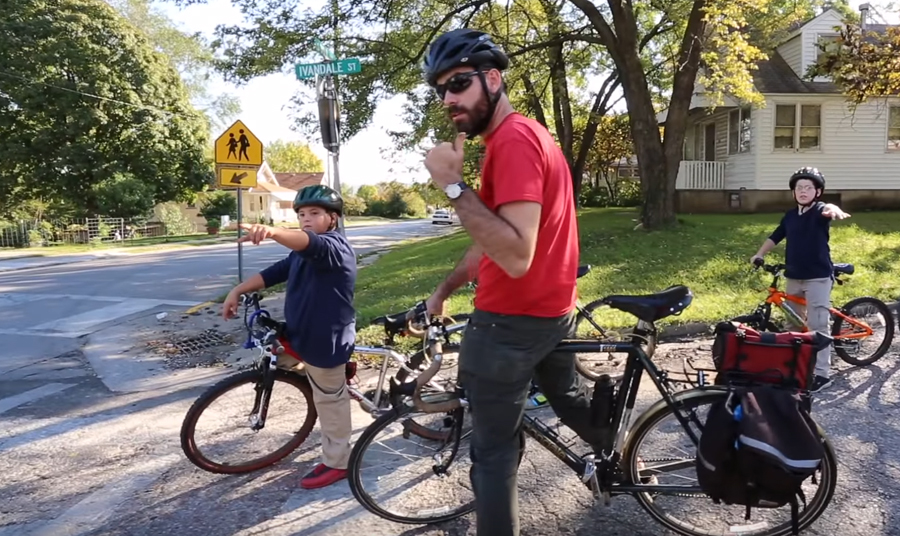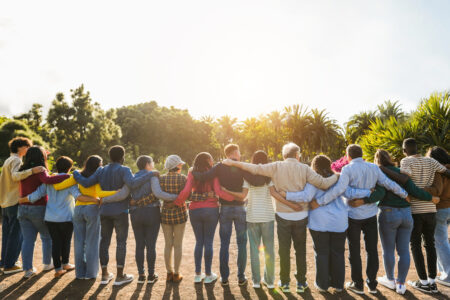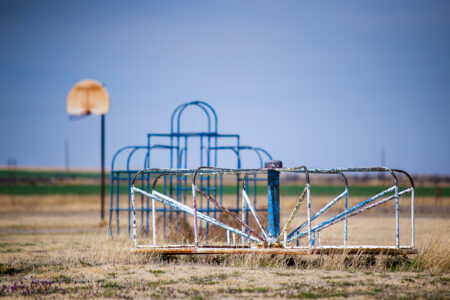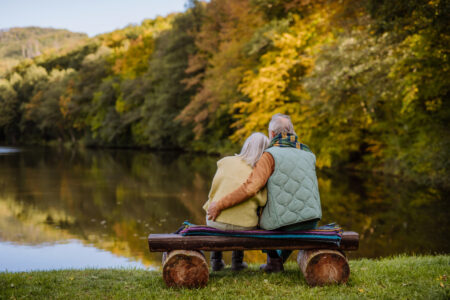Share On Social!
Middle-school students in the FreeWheels for Kids program are learning what it means to be leaders for healthy change. By bringing bike clubs to various schools and facilities across Kansas City, and its growing Latino population, this nonprofit is helping kids have fun and stay active, while teaching them how to fix bikes, build nature trails, and to voice their desire for a bike friendly community with bike-friendly streets.
EMERGENCE
Awareness: Benjamin Alexander was already an avid bicyclist when he started working at a local community center, where he mentored kids in Kansas City, Kan., which is 28% Latino.
“I rode my bike to work every day,” Alexander said.

At the community center in spring 2011, he was fixing his bike when a middle-school student asked him how he was doing it.
The student mentioned to him that he wanted to learn how to fix bikes for little kids.
Astonished by the student’s desire to help others, Alexander began searching for existing programs which might teach kids how to fix bikes, but he quickly found that there were no such programs in the area.
This lack of programs and the need for more activities at the community center led Alexander to think: Why not ask people for their unused or unwanted bikes and teach kids how to repair them?
Learn: Alexander seized this idea and, within a year he founded the FreeWheels for Kids nonprofit program. Free Wheels for Kids teaches youth how to fix bikes and how to ride safely in order to increase physical activity, provide mobility, and empower participants to bring healthy changes to their community.
The non-profit started to offer biking programs for kids, like:
• A six-session earn-a-bike (Master Mechanics) program where kids ages 12 and older repair a bike for someone else, then work to repair their own bike; and
• A bicycle lesson and safety training (BLAST) program that prepares kids ages 8-11 for events like bike rodeos and riding to school.
“It’s not like kids want to spend all day inside playing video games,” Alexander said. “By involving kids in the decision-making process, we can help them address some of those issues that the community faces, that keep them from being active.”
Frame Issue: After starting Free Wheels for Kids, Alexander began to hear from the students he mentored that there were challenges in the surrounding built environment that kept them from being active. Aside from high local obesity and poverty rates, a group of his students who met at the Boys & Girls Club reported that a path between their school and the club was unsafe—some even witnessing drug deals near a park.
He wanted to do something to improve the area’s built environment to ease biking and walking.
“More than 25% households don’t have access to the vehicle. Yet no walks or bikes due to safety concerns,” Alexander said. “There’s only one biking and walking path in the county, yet it’s rare to see someone using it.”
DEVELOPMENT
Education: To emphasize the great need to bring improvements to the area’s bike infrastructure and see wider-scale benefits from programs like FreeWheels for Kids, Alexander got busy telling others about it.
Instead of having the kids come to one location, Alexander decided to go to them.
He reached out to contacts he knew at local schools and neighborhood centers and explained what the program had to offer. Many of the locations that he reached out to were in such great need of programming that they were happy to offer the curriculum to kids in after-school programs.
Mobilization: He also put out flyers at bike shops asking for bike donations and started attending community meetings. By getting involved in these activities, he learned that groups like Healthy Communities Wyandotte, the Rosedale Development Association, the Latino Health For All (LHFA) Coalition, as well as several other partners throughout the community were also interested in doing something to improve access to physical activity and the built environment.
He partnered with Brett Shoffner of the Rosedale Development Association, to bring even more activities to the program.
Together Alexander and Shoffner developed a curriculum to teach kids science, technology, and engineering (STEM) concepts through the real-world application of building a nature trail for the community, called the Rozarks Trail.
“Given the opportunity, 12- and 13-year-olds have a lot of energy and a lot of maturity.” Alexander said.
Debate: Rather than centering on the issue of obesity, Alexander said FreeWheels for Kids focuses on what they can accomplish if they are active.
“The underpinning philosophy of everything we do is that our students are capable of a lot more than they’re given the opportunity to do,” Alexander said. “They’re capable of leadership, and they’re capable of defining what the community may need.”
ENACTMENT
Activation/Frame Policy: To capitalize on ideals for physical activity and empowerment/leadership for kids, Alexander envisioned a way to do both: free bike clubs at middle schools and community centers.
Bike clubs would serve two purposes:
• Bring students together to route local rides; and
• Identify areas of the city that were in great need of bike lanes and sidewalk improvements.
“The purpose of a bike club is to give youth ages 12-18 the chance to learn about what assets the community has as well as identify some things that might need improvement,” Alexander said. “The students do this all while getting exercise, learning to map trails, participating in civic change and anything else they can come up with.”
Shoffner Alexander, and Free Wheels for Kids students met to map out a nature trail by using GPS locators and flagging places along the path.
To show others what they wanted their streets to look like, they used a free online program called Streetmix.
“This neighborhood has traditionally had a reputation as a dangerous place to be, so a lot of what these kids can accomplish is just kind of boldly showing that yes we can be outside, which is incredible,” Alexander said.
Change: With funding from various groups such as the Healthcare Foundation of Greater Kansas City, and support from a grant that the Bethel Neighborhood Center received, FreeWheels for Kids established bike clubs.
According to a Kansas Health Institute blog, coordinators from the Bethel Neighborhood Center saw that kids and their parents liked FreeWheels for Kids so much that they decided to designate $10,000 to expand its program offerings at the community center. After applying for a Healthy Lifestyles Grant, Free Wheels for Kids also received a $14,160 grant from the Healthcare Foundation of Greater Kansas City.
Bike clubs are now offered at five different locations:
• Central Middle school
• Rosedale Middle school
• Arrowhead Middle school
• Bethel Neighborhood Center
• Boys & Girls Club of Kansas City, Kan.
Bike club members meet twice a week between 3-5 p.m. on Mondays and Wednesdays, or Tuesdays and Thursdays.
“Every time we set out to accomplish what we had set out to do, we find more support and more need,” Alexander said. “And now we’ve started to change the perception of this community as one of the most unfriendly areas to bike, to a strangely nice neighborhood for biking because all the kids are out riding their bikes.”
IMPLEMENTATION
Implementation: In Fall 2013, bike clubs identified three major projects that needed to happen:
1. bike lanes and sidewalk improvements on 10th street (an area that passes in front of K-8th grade schools and serves more than 1,200 students);
2. sidewalk and crossing improvements near Northwest Middle School; and
3. a north/south off-road connector in Shawnee Heights.
In December of that year, the Central Middle School bike club presented recommendations for a bike lane on 10th street to the county commission of Wyandotte County.
Although no immediate action was taken, the Kansas City Star reports that the commissioners were quite impressed by the students’ ability to not only identify the problem, but also come up with solutions. Given the initial progress of bike clubs, FreeWheels for Kids has decided to take bike clubs to as many schools and community centers as they can.
“We’re starting to see a change in how many people you see out biking, which is great because there aren’t that many soccer fields or opportunities for low-income families to be active,” Alexander said. “So we’re just kind of carving it out where we can.”
Now Alexander says people are contacting him to see how they can bring the six-session, earn-a-bike program, the bike safety curriculum, and bike clubs to their school or community center.
“We really are starting to see some pretty great outcomes, he said. “Even in terms of health…The kids ride their bikes everywhere now and they’re making the neighborhood safer for everyone.”
Equity: Just three years after getting started, FreeWheels for kids will reach about 900 students in 2014.
In the near future, FreeWheels for Kids plans to increase opportunities to even more kids by starting bike trains—or regular bike rides to school.
Sustainability: Collaborations and close contact with groups that have similar interests are a big part of bringing healthy changes to Wyandotte County.
For instance, on Sept. 20, 2014, when Healthy Communities Wyandotte held the grand opening of a new levee trail, FreeWheels for Kids was there to ride the trail and to show their support for the initiative. They also continue to partner with the Rosedale Development Association for the Rozarks Trail Project.
As for the bike lanes, according Alexander, the same students who spoke before the county commission might just see protected bike lanes become a reality in their neighborhood by the time they are in high school.
Explore More:
Green & Active SpacesBy The Numbers
33
percent
of Latinos live within walking distance (<1 mile) of a park
This success story was produced by Salud America! with support from the Robert Wood Johnson Foundation.
The stories are intended for educational and informative purposes. References to specific policymakers, individuals, schools, policies, or companies have been included solely to advance these purposes and do not constitute an endorsement, sponsorship, or recommendation. Stories are based on and told by real community members and are the opinions and views of the individuals whose stories are told. Organization and activities described were not supported by Salud America! or the Robert Wood Johnson Foundation and do not necessarily represent the views of Salud America! or the Robert Wood Johnson Foundation.



